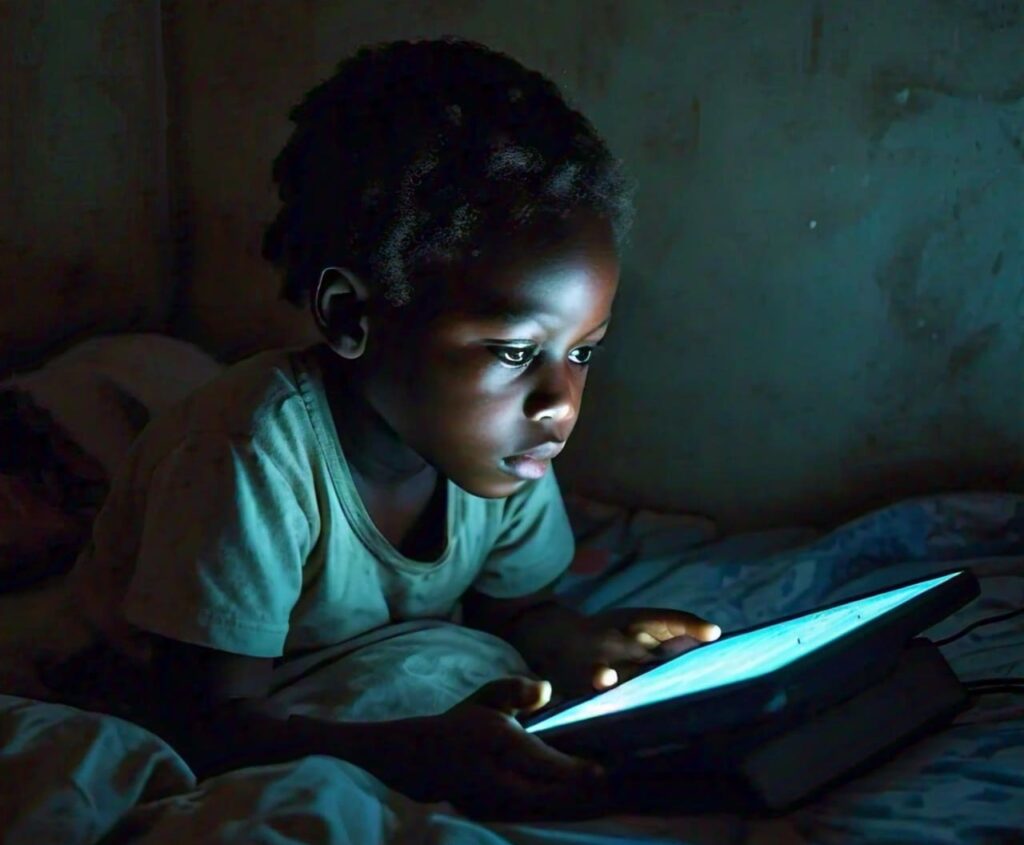
In Nigeria, where the demands of modern life have reached unprecedented levels, many parents find themselves juggling various roles—professionals, caregivers, and homemakers.
As they strive to balance these responsibilities, they often rely on digital devices to keep their children occupied while they manage work and other commitments.
While this may seem like a convenient solution, the repercussions of extended screen time on a child’s development are profound and far-reaching.
This article will explore the detrimental effects of excessive screen use on children and provide Nigerian parents with practical strategies to create a balanced, healthy environment for their children.
Reasons for the Rise of Extended Screen Time for Children
The increasing prevalence of digital devices in Nigerian homes has made screens a ubiquitous part of daily life. Smartphones, tablets, televisions, and computers have become integral tools for entertainment, education, and even social interaction.
However, the reliance on these devices for child-rearing has grown significantly, especially among busy parents.
Several factors contribute to this trend:
- Work-Life Imbalance: With the rise of remote work and the gig economy, many Nigerian parents find themselves working from home. The blurred lines between professional and personal life often lead to extended working hours, leaving parents with little time to engage their children in non-digital activities.
- Accessibility and Affordability of Digital Devices: As smartphones and tablets become more affordable and accessible, even in rural areas, they are increasingly being used as tools to keep children entertained. The availability of low-cost internet data plans also makes it easier for children to access online content, further contributing to increased screen time.
- Educational Demands: The push for digital literacy and e-learning, especially in the wake of the COVID-19 pandemic, has led to an increase in screen time for educational purposes. While this has its benefits, it also blurs the line between productive and excessive screen use.
- Cultural Shifts: There has been a noticeable shift in how leisure time is spent in many Nigerian households. Traditional outdoor play and family interactions are being replaced by screen-based activities, which are often seen as more convenient and less demanding on parents’ time.
While these factors are understandable, it is crucial for parents to recognize the potential dangers of relying too heavily on screens as a means of managing their children’s time.
The Impact of Extended Screen Time on Child Development
Extended screen time can have several negative consequences on a child’s development, affecting their cognitive, emotional, social, and physical well-being. Below, we explore these impacts in more detail.
1. Cognitive Development
Delayed Language Skills
Language development in children relies heavily on interactive communication with adults and peers. When children spend excessive time in front of screens, particularly passive forms of media such as television or non-interactive apps, they miss out on opportunities to engage in conversations that are vital for language acquisition.
This can lead to delays in speech and language development, as children are not exposed to the rich, varied vocabulary and sentence structures that come from real-life interactions.
Reduced Attention Span
The fast-paced nature of digital content, especially in video games and certain television shows, can condition children to expect constant stimulation.
This can make it difficult for them to focus on activities that require sustained attention, such as reading, solving puzzles, or even listening to instructions. Over time, this can hinder their ability to concentrate in school and may contribute to academic challenges.
Impaired Critical Thinking
Extended screen time, particularly on social media or entertainment platforms, often involves passive consumption of content. This can limit opportunities for children to engage in activities that promote critical thinking, problem-solving, and creativity.
Over-reliance on screens may stifle a child’s imagination and reduce their ability to think independently or analyze information critically.
2. Emotional and Social Development
Impaired Social Skills
Social skills are developed through interaction with others, learning to read facial expressions, body language, and tone of voice.
Children who spend excessive time on screens, particularly those who engage with digital content alone, may miss out on these crucial social learning experiences.
As a result, they may struggle with forming and maintaining relationships, understanding social cues, and developing empathy.
Increased Risk of Anxiety and Depression
There is a growing body of research linking excessive screen time to mental health issues in children, including anxiety and depression. Social media, in particular, can expose children to unrealistic standards of beauty, success, and happiness, leading to feelings of inadequacy and low self-esteem.
Additionally, the constant barrage of information and the pressure to stay connected can create a sense of overwhelm and stress in young minds.
Emotional Dysregulation
Extended screen time can affect a child’s emotional regulation, leading to increased irritability, frustration, and difficulty managing emotions.
This is particularly true when screen time is used as a primary means of distraction or pacification, rather than teaching children how to cope with their feelings in a healthy, constructive manner.
3. Physical Health
Obesity and Poor Physical Fitness
The sedentary nature of screen-based activities often means that children are spending less time engaging in physical activities that are crucial for their health.
This can lead to weight gain and associated health issues such as obesity, diabetes, and cardiovascular problems.
Moreover, children who do not develop a habit of regular physical activity may carry this sedentary lifestyle into adulthood, increasing their risk of chronic health conditions.
Vision Problems
Prolonged exposure to screens can cause digital eye strain, leading to symptoms such as headaches, blurred vision, and dry eyes.

For children, whose eyes are still developing, extended screen time can contribute to more serious vision issues, including myopia (nearsightedness).
Sleep Disruptions
The blue light emitted by screens can interfere with the production of melatonin, a hormone that regulates sleep. When children use screens, particularly before bedtime, it can disrupt their sleep cycle, making it harder for them to fall asleep and stay asleep.

Poor sleep can have a cascading effect on a child’s overall well-being, leading to mood swings, reduced academic performance, and weakened immune function.
Strategies for Nigerian Parents to Manage Screen Time for Children
While the challenges of modern parenting may make it tempting to rely on screens, there are several strategies that Nigerian parents can adapt to ensure a healthier balance for their children.
1. Set Clear Boundaries
Establishing clear and consistent rules around screen time is essential. Parents should set specific time limits for how long children can use screens each day, depending on their age and developmental needs.
For example, the American Academy of Pediatrics recommends no more than one hour of screen time per day for children aged 2 to 5 years. For older children, parents can create a schedule that includes time for outdoor play, homework, and screen-based activities, ensuring that screens do not dominate their daily routine.
2. Promote Screen-Free Zones
Creating screen-free zones in the home can help children develop healthier habits. For instance, the dining room can be designated as a space where no screens are allowed, encouraging family members to engage in conversation during meals.
Similarly, keeping screens out of bedrooms can promote better sleep hygiene, as children are less likely to be tempted by their devices before bedtime.
3. Lead by Example
Children often model their behavior on their parents, so it is important for parents to demonstrate responsible screen use. It is important for parents to set a positive example for their children by limiting their own screen time and prioritizing face-to-face interaction with them.
This also includes being mindful of how often screens are used as a tool for distraction or relaxation in the home.
4. Encourage Alternative Activities

Parents can introduce their children to a variety of activities, such as sports, arts and crafts, music, reading, and board games. These activities not only reduce screen time but also help children develop new skills, build confidence, and explore their interests.
5. Use Educational Content Wisely
If screen time is necessary, parents should ensure that the content is educational and age-appropriate. Interactive apps, educational games, and online learning platforms can provide valuable learning experiences when used in moderation.
Parents can also engage with their children during screen time, discussing the content and encouraging critical thinking.
6. Monitor and Discuss Screen Time
Parents should take an active role in monitoring their children’s screen time, including the types of content they are consuming.
Regular discussions about what they are watching or playing can help parents stay informed and provide opportunities to address any concerns about inappropriate content.
Open communication also allows parents to educate their children about the potential risks of excessive screen use and the importance of balance.
In conclusion, while digital devices offer a convenient solution for keeping children occupied, the long-term impact of extended screen time on child development is a critical issue that Nigerian parents must address.
By understanding the potential risks and implementing practical strategies to manage screen time, parents can create a balanced environment that supports their children’s cognitive, emotional, social, and physical development.
Ultimately, prioritizing activities that foster growth and well-being over screen-based entertainment is key to raising well-rounded, healthy children in today’s digital age.



